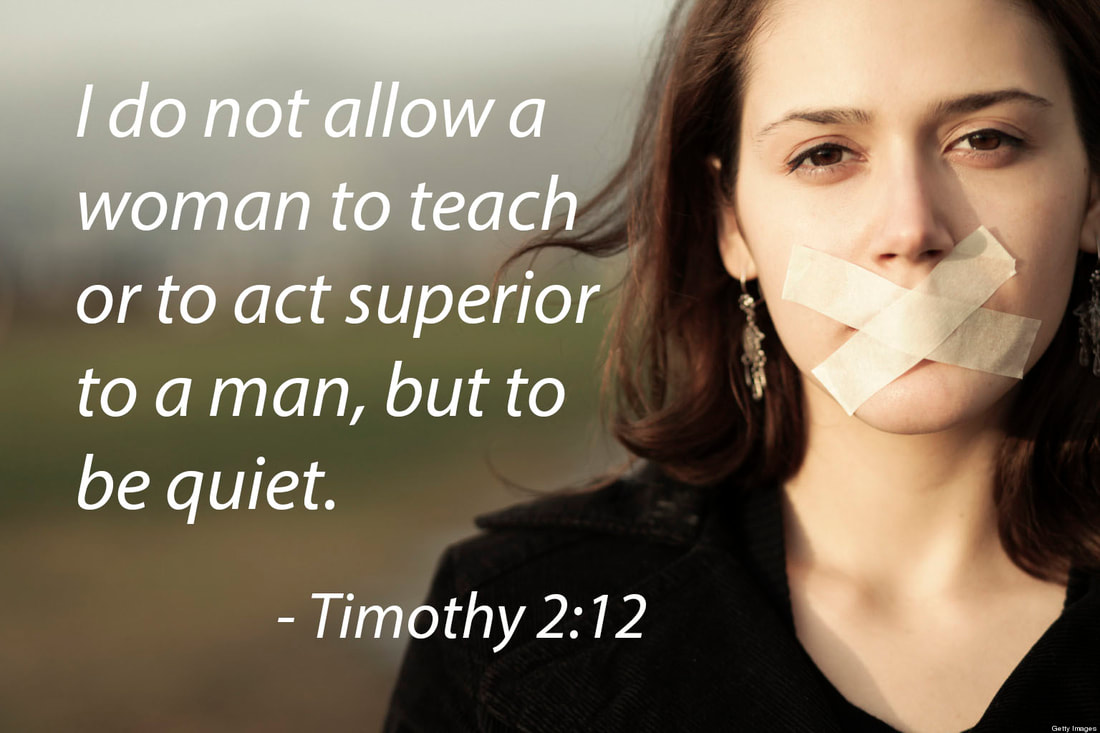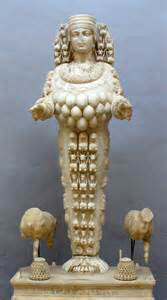No one takes the Bible at face value. First, because no one grows up speaking Koine Greek and ancient Hebrew at home (so they can't read its "face value"), but second because English translations tell even the most novice reader that certain commands are culturally irrelevant. When you read Paul's repeated command to "Greet one another with a holy kiss" (Romans 16:16; 1 Cor 16:20; 2 Cor 13:12; 1 Thess 5:26), no one gets convicted and starts puckering up for church. Those commands were clearly intended for a different cultural context, and we recognize it. We know to distinguish the temporary cultural expression from its enduring principle.
The same cultural sensitivity must be applied to 1 Timothy 2. In first-century Ephesus where Timothy pastored churches, braided hair and female teachers were a bad idea. Why? The first one is easy. Braided hair, gold jewelry, and expensive clothing flaunted wealth. And Paul wanted "those who are rich in this present world not to be conceited" (1 Timothy 6:17). The injunction against female teachers and Paul's prescription for females to learn quietly in church gatherings are much more culturally nuanced.
|
I have taught biblical hermeneutics (i.e., how to interpret the meaning of Bible passages correctly) for 15 years because many churches have neglected to teach people how to handle the Bible after encouraging them to read it everyday. Primarily, Bible readers do not learn how to connect a passage they are studying to its literary and historical context. That's why we get extended discussions about 1 Timothy 2:11-15 that don't connect its meaning to 1 Timothy 2:8 or 2:4 or 1:7 or 6:20 and the religious context in Ephesus.
In the shortest possible commentary I want to explain the historical and literary features affecting the meaning of 1 Timothy 2:11-15 to show which particular interpretation fits best into the overall context. It's going to get technical, but you need to see the evidence that undermines the long-standing and mistaken use of this passage against female pastors. (For a fuller culturally informed study of what the Bible teaches about women, buy William Webb's Slaves, Women & Homosexuals: Exploring the Hermeneutics of Cultural Analysis.) |
1. 1 Timothy 2:11-12 instructs women to take on a posture of learning humbly rather than talking when they don't know what they're talking about.
Twice Paul instructs women to learn in quietness. The Greek word hesuchia (“quiet” or “humbly”) is the typical posture of a wise person who is ready to learn rather than a fool who espouses a mix of truth and error. Philo uses the word to contrast the respectable man and the “vulgar man, who spends his days meddling, running around in public, in theaters, tribunals, councils, and assemblies, meetings and consultations of all sorts; he prattles on without moderation, fruitlessly, to no end; he confuses and stirs up everything, mingling truth with falsehood, the spoken with the unspoken, the private with the public, the sacred with the profane, the serious with the ridiculous, not having learned to remain quiet (hēsychian), which is the ideal when the situation calls for it; and he pricks up his ears in an excess of bustling busyness” (Philo, Abraham 20). Josephus (War 2.130) praises the benefits of monastic spirituality for all the same qualities Paul commends in 1 Timothy 2:11-12: “If you see a monk walking along alone, with a demeanor that bespeaks humility, modesty, quietude, and tranquility--tapeinon kai praon kai hēsychion kai ēremon—envy the happiness of that man.” Paul instructs women to exercise each one of these same virtues because apparently women in Ephesus were not doing so.
2. Paul's instructions imply women in the church at Ephesus did not have adequate "knowledge of the truth,” and therefore needed to learn first rather than teach crazy stuff.
False teachers were convincing women of bad doctrine according to 1 Timothy 3:6 and teaching things like “forbidding marriage and prohibiting food consumption” (1 Timothy 4:3). So Paul's concern is about women propagating bad theology not just the idea of women teaching. Paul is putting a stop to "what" they were teaching not creating a universal rule for "who" can teach whom.
|
3. Paul's language in 1 Timothy 2:12 pinpoints his concern is not generally with women teachers but a specific situation with women in Ephesus.
Paul’s expression “I do not permit” employs the Greek verb epitrepō . The use of epitrepō in the New Testament, in every case, is “related to a specific and limited set of circumstances” (A.C. Perriman, “What Eve Did, What Women Shouldn’t Do: The Meaning of Authenteō in 1 Timothy 2:12″, Tyndale Bulletin 44.1 [1993] 130). So Paul's prohibition of women teaching is only meant for that time and place. |
The rare usages of authentein prior to, during, and after the NT period create a Semantic range with 4 basic meanings: to murder, originate, act independently, or dominate as a superior
- Murder. Classical Greek, or Attic Greek, sources (Thucydides, Herodotus, Euripides, and Aeschylus) use the verb for homicide and suicide, especially found in legal briefs for murder cases. However, Philo and Josephus use it the same way in first-century Koine Greek writings. Jewish historian Josephus speaks of Antipater as the real murderer (authentein) of Pheroras whom he poisoned (Jewish War 1.582; 2.240).
- Originate. Grammarian Aristonicus Alexandrinus comments on a section of Homer’s Iliad in On the Signs of the Iliad I.694 (9.694) (circa 27 BC) where authenteō occurs as an articular participle in the phrase, ho authentōn tou logou: “the author of the speech.” Egyptian magic and gnostic-papyri use the terms authentes, authentikos, and authentia to describe the original or primal source.
- Act independently. The verb authenteō was typically used in non-literary, or colloquial, Koine Greek. First Timothy was a letter written in non-literary Koine Greek. If you consult the Moeris Atticista Lexicon Atticum (‘Moeris the Atticist’s Attic Dictionary’), Aelius Moeris, a second century lexicographer, lists Attic words with their Hellenistic (or Koine) equivalent. Next to the word autodikēn (same as autodikein), Moeris has the word authentēn (same as authentein, the form found in 1 Timothy 2:12). The shared meaning is “self-determination” or doing your own thing.
- Dominate as a superior or master. Three Astrological Texts from first–third centuries AD use the verb authenteō to refer to either “the rulership of one planet over another, or to the superior social position enjoyed by those born under favorable astrological conditions.” These texts are (1) Methodus Mystica (first century AD), (2) Ptolemy’s Tetrabiblos (second century AD), and (3) Papyrus Tebtunis 276 (line 28) (second or third century AD). For example, Ptolemy writes, “Therefore, Saturn when he alone takes control of the soul and has gained dominance/mastery [authentēsas] of Mercury and the moon.” (Tetrabiblos 3.14.10). After the first-century, this notion of dominance or control became the common definition in all the Greek lexicons. Most English Bibles therefore select the phrase “have authority” to translate authentein. But does that translation capture the full meaning of authentein in the context of 1Timothy?
5. The context of 1 Timothy suggests the best translation of the verb authentein in 2:12 is: “I do not permit a woman to teach or to act superior to a man.”
The question at hand in 1 Timothy is "who" brings divine knowledge of the truth and salvation to people. The Ephesians were buying into a pagan belief that women were special mediators of that truth and salvation to men. Paul is correcting the false teaching that women had some sacred connection to divine knowledge that made them superior to men and more fit to teach about spiritual things. That is why Paul tells men in 1 Timothy 2:8 to go directly to God in prayer.
The translation of authentein in 1 Timothy 2:12 as "to act superior" primarily employs the fourth definition above. However it incorporates the second definition, originator or primal source, because female claims of superiority were rooted in the false teaching that they gave life to man without the help of any man. The heresy that women were mediators of divine knowledge and spiritual life to men is what Paul corrects in 1 Timothy 2:13-14.
6. 1 Timothy 2:13-14 corrects a Proto-Gnostic heresy that Eve gave Adam divine knowledge and spiritual life. The heresy combined Ancient Greek belief in the female origins of all life with a revised version of the Jewish story of creation in the Garden of Eden. The heresy twists the biblical story so that Eve gives Adam the gift of spiritual life and knowledge of God rather than just sinning by eating of the tree of knowledge.
Paul tells us in 1 Timothy 1:7 that certain people were pretending to be "teachers of the Law" (the section of Scripture containing the story of Adam and Eve) when they did not know what they were talking about. Ancient sources describing elements of this distorted version of Adam and Eve’s story appeared in later generations after the heresy had developed into full-blown Gnosticism:
- In the Apocalypse of Adam (50-150 CE) Adam says Eve “taught me a word of knowledge of the eternal God.”
- The Hypostasis of the Archons (200-300 CE) is an esoteric interpretation of Genesis chapters 1-6 in which Adam acknowledges Eve gave him life: The rulers took counsel with one another and said, “Come, let us cause a deep sleep to fall upon Adam.” And he slept. – Now the deep sleep that they “caused to fall upon him, and he slept” is Ignorance. – They opened his side like a living woman. And they built up his side with some flesh in place of her, and Adam came to be endowed only with soul. And the spirit-endowed woman came to him and spoke with him, saying, “Arise, Adam.” And when he saw her, he said, “It is you who have given me life; you will be called ‘mother of the living’. For it is she who is my mother. It is she who is the physician, and the woman, and she who has given birth.
- A later Gnostic text, The Origin of the World (270-330) continues to celebrate female superiority as the originator of life: Now, Eve is the first virgin, the one who without a husband bore her first offspring. It is she who served as her own midwife. For this reason she is held to have said: It is I who am the part of my mother; and it is I who am the mother. It is I who am the wife; it is I who am the virgin. It is I who pregnant; it is I who am the midwife. It is I who am the one that comforts pains of travail.
|
Paul reminds women that a male was created before a female not to say men are superior but to correct the false teaching that women were superior because they had spiritual life first. His reminder that Eve’s decision to eat of the tree of knowledge transgressed God’s command corrects the local heresy that the first woman blessed humanity with the knowledge of the Divine through that act. However, bringing up her mistake is not designed to say women are more easily deceived. Paul is making counterpoints to false claims not universal claims of female inferiority. We can verify this interpretation by seeing how Paul uses Eve's deception as a paradigm for how both men and women can believe bad teaching in 2 Corinthians 11:3.
8. 1 Timothy 2:15 assures God’s help during childbirth since Ephesian women believed Artemis kept them alive -- a role Eve took on in later Gnosticism.
|
Paul knew women would fear for their lives if they rejected their local religion and no longer honored Artemis. Women believed Artemis protected them as a divine midwife during labor. So 1 Timothy 2:15 says God will do what people believed Artemis was supposed to do.
|
- Strabo (63/64 BC–ca. AD 24), writing within the same century as Paul, describes the local Greek legend that explains why Artemis had special compassion for women during childbirth. In his Geography he refers to Ortygia (a grove adjacent to Ephesus) as both the name of a midwife and the name of the place where Leto gave birth to Artemis and then suffered on the brink of death giving birth to her twin brother after nine days of labor: “Then comes the harbor called Panormus, with a temple of the Ephesian Artemis; and then the city Ephesus. On the same coast, slightly above the sea, is also Ortygia, which is a magnificent grove of all kinds of trees, of the cypress most of all. It is traversed by the Cenchrius River, where Leto is said to have bathed herself after her travail. For here is the mythical scene of the birth, and of the nurse Ortygia, and of the holy place where the birth took place, and of the olive tree nearby, where the goddess is said first to have taken a rest after she was relieved from her travail. (Strabo, Geography, 14.20). As the legend goes, Artemis felt how great her mother's pain was in childbirth and decided to remain a virgin herself and compassionately care for women in labor as one of her divine duties.
9. The entire passage beginning with 1 Timothy 2:3-5 makes sense together when the local beliefs and heresy are understood.
Paul specifically claims that “God [is] our Savior, who desires all men to be saved and to come to the knowledge of the truth. For there is one God, and one mediator between God and men, the man Jesus Christ." In the proto-Gnostic heresy Paul corrects in 1 Timothy, men could learn hidden knowledge only from a woman. So Eve served as a mediator of truth. Paul wants his readers to know that Jesus is and does what they thought spiritually special women were and did. His specific emphasis that "the man Jesus Christ" is the mediator of knowledge and salvation was no general review of gospel truths but a pointed correction to a local problem.
10. The entire message of 1 Timothy makes sense when all of Paul’s comments about the Ephesian heresy are situated in the Greco-Jewish heresy of a virgin female originator of all life that gave women spiritual superiority to men.
|
|
"The opposing arguments of what is falsely called ‘knowledge’ ” (mentioned in 1 Timothy 6:20-21) involved the belief in female superiority over men because virgin women experienced special union with God and could share their spiritual power and insights with men. Hence Paul condemns people who forbid marriage in the Ephesian church for spiritual reasons (1 Tim. 4:3a). The virgin status of Artemis explains why virginity and celibacy were highly esteemed virtues among some Ephesians, but Paul saw such asceticism as dangerously entangled with local religion. Contrary to a theory popularized by Kroeger in I Suffer Not a Woman, no evidence exists that people in first-century Asia viewed Artemis as a fertility or sex goddess and therefore practiced temple prostitution (see Sondra Gahn, The Identity of Artemis in First-Century Ephesus). Artemis was actually praised as the divine tomboy who could save ("Artemis the Savior" was a common regional epithet) and protect people without any man’s help—a strength celebrated in her great hunting exploits.
|
When you put all the pieces above together, Paul is telling Timothy to prohibit women from teaching or practicing a local heresy. He wanted them to learn the truth of the Gospel rather than espouse a distorted mix of theology from Greek philosophy and local religion that misconstrued Genesis 1-3. Paul was specifically concerned that "what" women were teaching confused "who" the real mediator of spiritual life and divine knowledge is. Women were displacing "the man Jesus Christ" as they claimed spiritual superiority over men.
So 1 Timothy 2:12 does not issue a universal mandate against female preachers or pastors. Paul is simply giving sound advice to a local congregation that was allowing misinformed teachers to promote bad theology. It is a contextualized command for a specific time and place. If you read the first 7 verses in 1 Timothy, Paul explicitly targets particular legends and warped teaching about the Law in Ephesus. 1 Timothy 1:3-4a says, "I want you to stay in Ephesus, just as I urged you when I was on my way to Macedonia. Some people there are teaching false doctrines, and you must order them to stop. Tell them to give up those legends."
Once Paul gained confidence that Ephesian women had learned the truth and stopped teaching theological myths, we would assume they would be allowed to teach and lead the church just like Priscilla, Phoebe, Junia, and many women were doing at other churches Paul oversaw. The enduring principle is to prevent uneducated folks from teaching some errant insight from God they have devised by distorting Scripture with cultural beliefs or local religious ideas. We have to watch out for both men and women who do that before they have received adequate instruction in the faith.












 RSS Feed
RSS Feed
